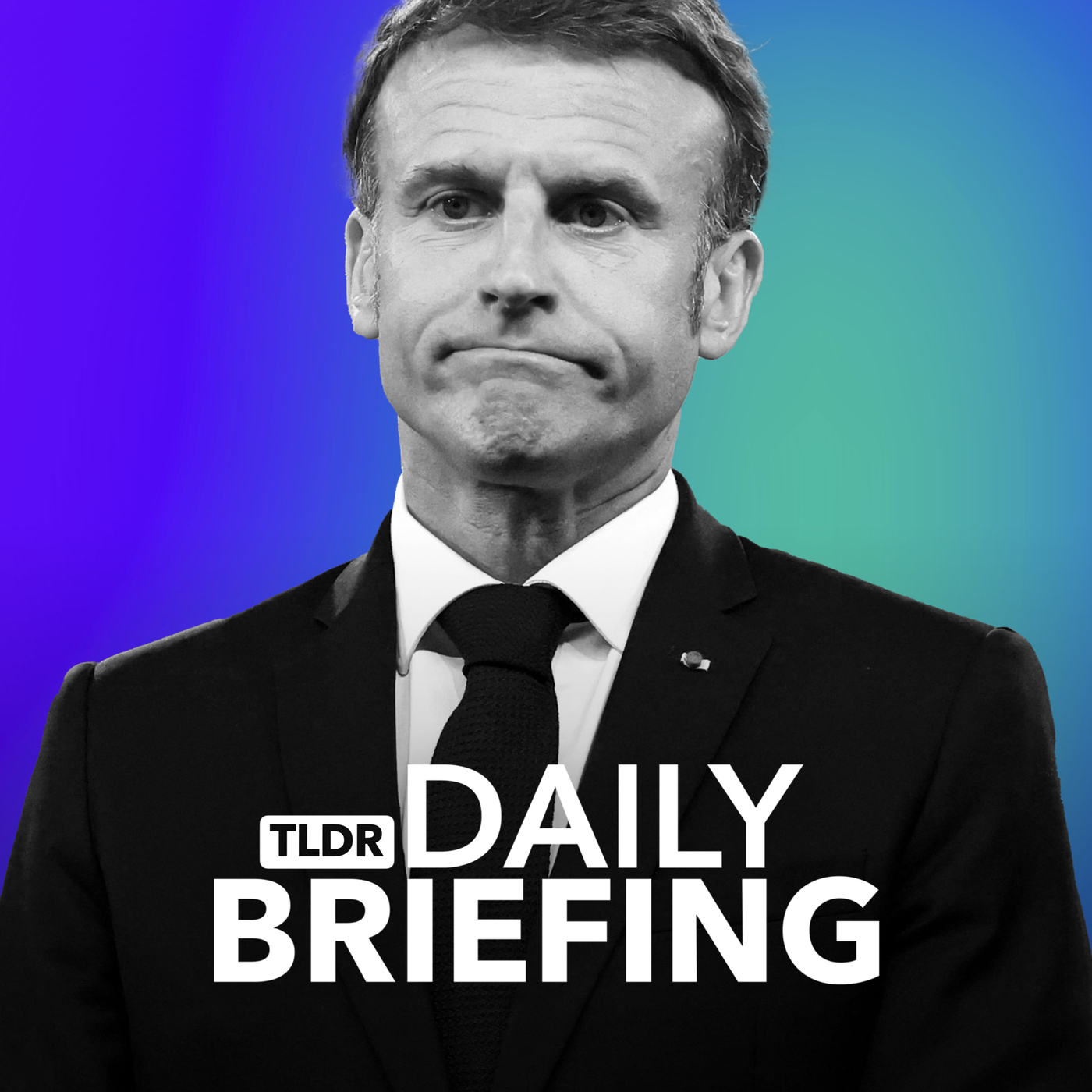
Deep Dive
Why is Emmanuel Macron facing calls to resign?
Macron faces calls to resign due to the ousting of his Prime Minister, Michel Barnier, in a historic no-confidence vote. This turmoil began with disagreements over a proposed budget that included a €60bn package of tax hikes and spending cuts, leading to substantial divisions within Parliament.
What is the significance of Michel Barnier's tenure as Prime Minister?
Barnier's tenure, lasting just three months, marks the shortest premiership in the history of France's Fifth Republic. His government imploded primarily due to disagreements over a proposed budget.
How does the political landscape in France look for Macron currently?
The political landscape in France is complex and contentious, with a gridlocked Parliament failing to produce a clear majority. Macron needs to either rebuild alliances with Barnier's Les Républicains party or form a new coalition, facing resistance from both far-left and far-right factions.
What is the proposed solution for Macron to secure a stable government?
Macron has hinted at presenting a special finance law to Parliament by mid-December, underscoring the urgency of securing a stable government in these turbulent times.
Why is South Korean President Yoon Suk-yeol facing calls for suspension?
Yoon Suk-yeol is facing calls for suspension following his controversial decision to try and impose martial law. The main opposition Democratic Party has initiated impeachment proceedings against him, citing credible evidence that he ordered the arrest of key politicians.
What is the current status of Yoon Suk-yeol's approval ratings?
Yoon Suk-yeol's approval ratings are at a historic low of 13%, signaling a precarious future for his presidency.
What is the strategic importance of Homs in Syria?
Homs is a strategic city linking Damascus to the Alawite heartland on the Mediterranean coast, which is Assad's political stronghold and key to his grip on power. Losing Homs would be a significant blow to Assad's regime.
What is the proposed plan for Europe's joint defence fund?
The proposed plan involves setting up a half a trillion euro joint defence fund for common defence projects and arms procurement. Individual countries would issue bonds rather than the EU as a whole, allowing non-EU countries like the UK to participate.
Why has Fat Albert the polar bear become a celebrity?
Fat Albert, weighing in at 680 kilograms, is substantially larger than the average polar bear. His journey to stardom began when he was photographed by a wildlife photographer from Alaska, capturing the attention of people worldwide for his size and cuteness.
- No-confidence vote against Prime Minister Michel Barnier
- Disagreements over a €60bn budget
- Divisions within the French Parliament
- Macron's potential resignation
Shownotes Transcript
Today, French President Emmanuel Macron faces calls to resign, South Korea's president faces impeachment, and Europe plans for a joint defence fund. From TLDR News, this is your daily briefing for Friday 6th December 2024. In a dramatic turn of events for French politics, President Emmanuel Macron is faced with increasing opposition after the ousting of his Prime Minister, Michel Barnier, in a historic no-confidence vote.
This political upheaval has prompted questions about Macron's future and the stability of his government. Many have asked whether Macron will or will not resign, but it seems that Macron's intentions are to complete his term, which runs until 2027. The turmoil began after the far-right National Valley and the leftist New Popular Front allied to topple Barnier's government, accusing it of failing to address critical issues, including a contentious budget designed to reduce the country's deficit.
Yesterday evening, in his first public address after the vote, Macron defended his administration, stating, Barnier's tenure, lasting just three months, marks the shortest premiership in the history of France's Fifth Republic.
His government imploded primarily due to disagreements over a proposed budget that included a €60bn package of tax hikes and spending cuts.
The National Rally, led by Marine Le Pen, voted down the budget, reinforcing its threat to do so if specific conditions were not met, demonstrating the substantial divisions within the Parliament. Now, with a gridlocked Parliament that has failed to produce a clear majority, Macron faces the daunting task of appointing a new Prime Minister who can navigate these fractured political waters.
The president hinted he would name a successor in the coming days. However, any new administration will have to contend with ongoing disputes on budget discussions and resistance from both far-left and far-right factions. Macron now finds himself at a crossroads, needing to either rebuild alliances with Barnier's Les Républicains party or form a new coalition.
Initially, overtures towards moderate left parties have yielded no cooperation, as far-left groups, particularly the France Unbowed, are adamant against supporting any prime minister not affiliated with their ranks. As uncertainty looms over the future of Macron's presidency, the political landscape in France remains complex and contentious.
Macron is committed to ensuring the continuity of public services and has hinted at presenting a special finance law to Parliament by mid-December, further underscoring the urgency of securing a stable government in these turbulent times.
Now, before we continue, I just wanted to quickly thank everyone who continues to watch and like The Daily Briefing every single day. Making these videos requires a lot of research and hard work to make sure that we bring you the most up-to-date and accurate news every day. And that's also an expensive process.
If you want to support our journalism in 2025 and make sure that we can keep doing the daily briefing, then there's no better way to do this than by purchasing a copy of our magazine too long.
That's because buying too long doesn't just get you a high quality magazine, it also allows you to invest in independent journalism and join us in shaping the future of news. Now this most recent issue focuses on the 29 biggest elections of the year, making sure you understand what really happened in this mega election year and commemorating one of the biggest years in news.
We don't just discuss elections, though. We also run through China's trade issues, Biden's successes and failures, and the UK's new opposition leader and the state of the wars in Ukraine and Gaza. Plus, the fact it's a magazine also means we're not constrained by the time limits or algorithms imposed by YouTube.
Unlike fleeting news cycles and algorithmic feeds, TooLong offers thought-provoking analysis and comprehensive coverage that's truly worth holding. If you're convinced, you have three more decisions to make. First, do you want a physical or digital copy? The physical is a high-quality, 60-page perfect
bound magazine shipped right to your door. The digital is slightly cheaper, especially if shipping is a concern. Your second choice is the standard or premium edition. The standard is just a copy of the magazine, while premium also gets you access to our monthly behind-the-scenes podcast, The Bullpen, where we break down all of the production of Too Long and TLDR more generally, and you'll get your name printed in the thank you section of the magazine. Finally, do you want to subscribe? If you do, you'll get a copy of Too Long every four months.
meaning you'll never miss an issue. Plus, you'll also get 25% off every copy as long as you stay subscribed. If you can, subscribing also gives us a reliable income stream, which is super useful for us. Regardless of which option you choose, you can buy a copy right now at too-long.news or click the link in the description. Thanks for your support and thanks for backing Too Long.
With Macron facing calls to resign in France, in South Korea, the president, Yoon Suk-yeol, is facing calls for suspension following his controversial decision earlier this week to try and impose martial law. The main opposition Democratic Party has initiated impeachment proceedings against Yoon, with a vote scheduled for Saturday.
Opposition lawmakers have been vigilant in Parliament, fearing another martial law attempt amid ongoing political chaos. Acting Defence Minister Kim Sun-ho said fears and reports that there may be another attempt to impose martial law were not true. Han Dong-hoon, the leader of Yoon's ruling Conservative People's Power Party and once a key ally to Yoon, also said that the President's suspension was crucial for the nation's safety.
He cited credible evidence that Yoon ordered the arrest of key politicians on the night he declared martial law. While it wasn't clear how widely hands of views are shared within the party, his faction holds about 20 lawmakers, and they were among those who joined with the opposition in the early morning hours of Wednesday to vote down the martial law order. If they stay united, that would be enough to swing the vote against Yoon.
An impeachment bill requires a two-thirds majority in the 300-member assembly, with Yun's party holding only 108 seats. The country is reminded of its turbulent past, as soaring tensions and Yun's diminishing approval ratings, now at a historic low of 13%, signal a precarious future for his presidency. Over to the latest development in Syria, where tens of thousands of people are fleeing Syria's third-largest city, Homs.
Syrian rebels launched a surprise offensive against the government last week and have so far captured two major cities. On Thursday, the rebels seized Hama with basically no resistance from Assad's forces.
The taking of Hama was the second major blow to President Bashar al-Assad's regime, who lost control of Aleppo last week. Government forces soon withdrew to the next city along the M5, Homs, which is slightly smaller than Hama. Yet despite its small size, Homs is a strategic city linking Damascus to the Alawite heartland on the Mediterranean coast, Assad's political stronghold and key to his grip on power.
If Assad were to lose Homs, it would be essentially game over. What's more is that neither Iran nor Russia, Assad's two main allies, have been able to provide substantial support to Assad, as both have been preoccupied with their own affairs. Meanwhile, an estimated 280,000 people have been displaced, and the UN has said the fighting is also worsening an already horrific situation for civilians in the north of the country.
We have a full video coming out this weekend over on TLDR News Global, so do check that out. Moving to Europe now, where countries in the bloc are discussing setting up a half a trillion euro joint defence fund to be used for common defence projects and arms procurement. The current plan would see individual countries issue bonds rather than the EU as a whole.
It's important to note here that this would mean that countries outside the EU, like the UK, could participate. Previously, such plans have been ruled out by fiscal hawks within the bloc. Reportedly, the plans have been raised in the UK, but the Starmer government has not yet committed to taking part in any such scheme. Clearly, this is an attempt to balance against Donald Trump, who's threatened to withdraw US support from NATO allies if they don't pay their way.
This though seems like one of the most ambitious options and it's unclear whether the bloc will actually agree to it.
In the final uplifting story today, we discuss a polar bear from Alaska. Known as Fat Albert, the polar bear has become something of a celebrity. Weighing in at 680 kilograms, he's substantially larger than your average polar bear, which usually weighs only 450 kilograms. His journey to stardom began when he was photographed by Edward Baudreau, a wildlife photographer from Alaska. As the Times of India explained, people have noticed that he's huge, yet somehow he remains cute.
